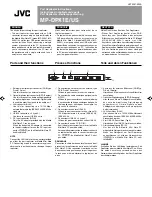
If Something Goes Wrong
Resolving a Hardware Conflict
Part I: Getting To Know Your Computer
314
What are IRQ and DMA System Resources?
The channel to the CPU is called an Interrupt ReQuest (IRQ)
because it interrupts what the processor is doing and requests
some of the processor’s time. If two or more devices use the same
IRQ, the processor doesn’t know which device is asking for atten-
tion. This causes a problem.
Similarly, the data required by the device is stored in a specific
place or address in memory called the Direct Memory Address
(DMA). If two or more devices use the same DMA, the data
required by one device overwrites the data required by the other. If
either of these situations occur, you have a hardware conflict.
Avoiding Conflicts with Plug and Play
With Plug and Play and Windows 95, avoiding hardware conflicts
is easy. Plug and Play is a computer standard that helps the system
BIOS (basic input/output system) and Windows 95 to automati-
cally assign system resources to Plug and Play-compliant devices.
In theory, if every device connected to the computer is Plug and
Play-compliant, no two devices will compete for the same system
resources. You simply plug in the device and turn your computer
on. Windows 95 automatically configures your system to accom-
modate the new device.
Resolving Conflicts with Non-Plug and Play Devices
If you install an older, non-Plug and Play device that Windows 95
cannot automatically identify, Windows 95 may have difficulty
assigning system resources to it. As a result, a hardware conflict
can occur. To find out what resources Windows 95 has assigned to
a device, see “Checking Device Properties” on page 316. If
Windows 95 is unable to provide the information you need, the
pre-assigned settings for IRQs, DMAs and I/O assignments are
listed in “System Resources” on page 455 for your reference.
















































